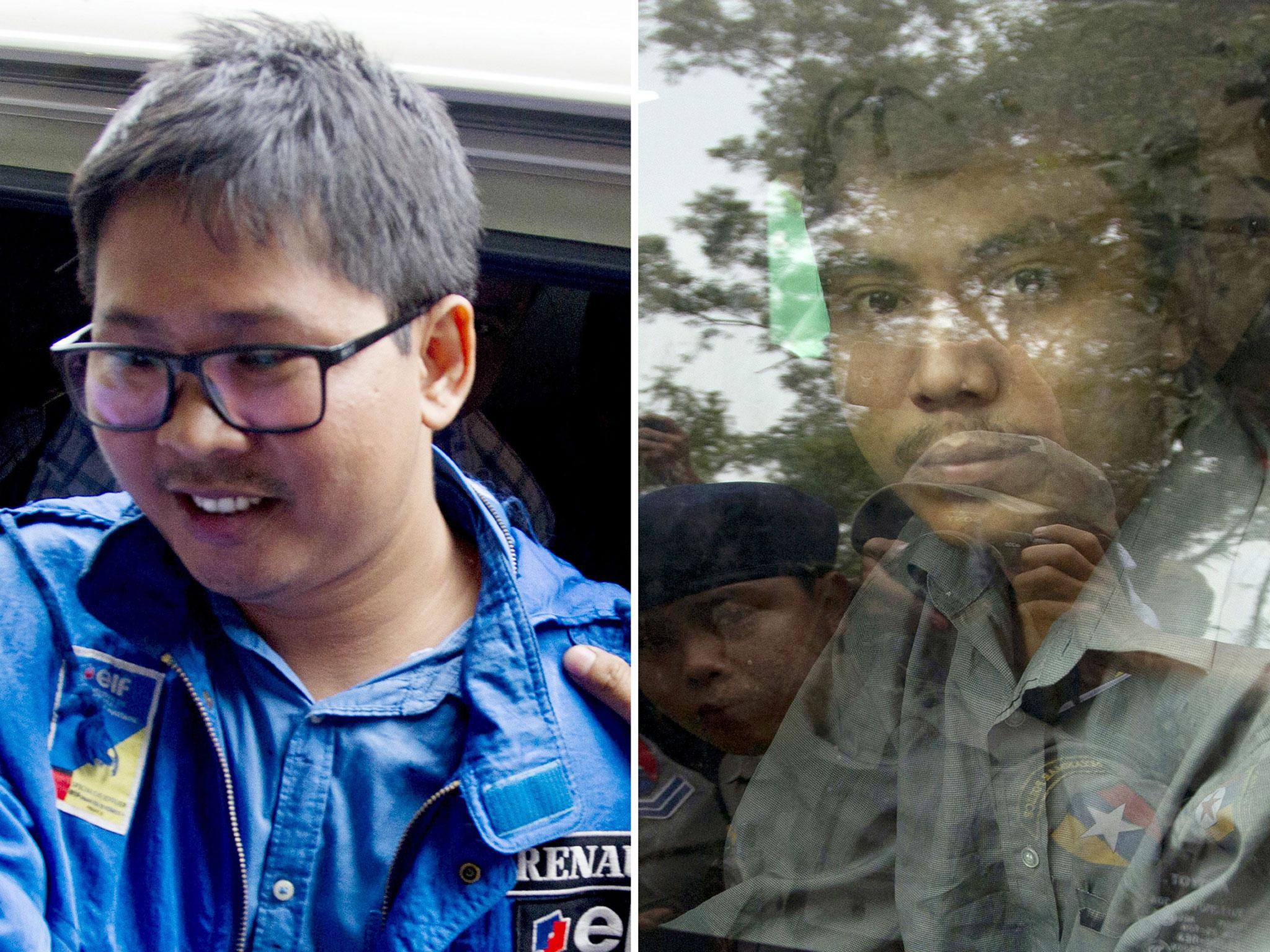Myanmar journalist hugs daughter goodbye as he faces 14 years in prison for breaching Burmese Official Secrets Act
Reuters reporters Kyaw Soe Oo and Wa Lone arrested in December after allegedly accepting 'important secret papers' from two police officers in the crisis-hit Rakhine state

Your support helps us to tell the story
From reproductive rights to climate change to Big Tech, The Independent is on the ground when the story is developing. Whether it's investigating the financials of Elon Musk's pro-Trump PAC or producing our latest documentary, 'The A Word', which shines a light on the American women fighting for reproductive rights, we know how important it is to parse out the facts from the messaging.
At such a critical moment in US history, we need reporters on the ground. Your donation allows us to keep sending journalists to speak to both sides of the story.
The Independent is trusted by Americans across the entire political spectrum. And unlike many other quality news outlets, we choose not to lock Americans out of our reporting and analysis with paywalls. We believe quality journalism should be available to everyone, paid for by those who can afford it.
Your support makes all the difference.A journalist was seen hugging his two-year-old daughter goodbye outside a Myanmar court as he faces 14 years in prison for allegedly breaching the Official Secrets Act.
Reporters Kyaw Soe Oo, 27, and Wa Lone, 31, who both work for the Reuters news agency, were arrested in Myanmar in December.
The journalists had been invited to meet police officers who worked in Rakhine state, where 688,000 Rohingya Muslims have fled an army crackdown on insurgents since late August, according to estimates by the United Nations.
They were arrested after allegedly accepting “important secret papers” from the two officers, who they had never met before.
Police sought permission from the nation’s president Htin Kyaw to proceed with an investigation just an hour after they were arrested, a Yangon court heard on Tuesday.
Police Lieutenant Colonel Yu Naing of Yangon’s northern district, told the court that authorisation was sought that evening from President Htin Kyaw’s office to proceed with a case under the little-used colonial-era Official Secrets Act.
The act dates back to 1923, when Myanmar, then known as Burma, was a province of British India.
“The accused were arrested around 9 o’clock on the 12th, and ... the letter to ask permission from the president’s office was ready at 10 o’clock,” said defence lawyer Than Zaw Aung.
Another defence lawyer, Khin Maung Zaw, said the authorisation speed was unusual, and that it typically would be sought about a week into any probe and issued by a lower-ranked minister rather than the president.
The reporters have been accused under Section 3.1 (c) of the act, which covers entering prohibited places, and taking images or obtaining secret official documents that “might be or is intended to be, directly or indirectly, useful to an enemy”.
The Ministry of Information has previously cited police as saying the two journalists were “arrested for possessing important and secret government documents related to Rakhine State and security forces”. It said they “illegally acquired information with the intention to share it with foreign media”.
A ruling on an application for bail will be announced at the court’s next hearing, on 1 February, Khin Maung Zaw said.
In a statement, Reuters said: “We await the court’s ruling on bail. Time is of the essence and we continue to call for Wa Lone and Kyaw Soe Oo’s prompt release. They are innocent of any wrongdoing and should be allowed to return to their jobs reporting on events in Myanmar.”
The two journalists were handcuffed as they were led into the court.
Wa Lone smiled and gave a thumbs-up sign to the crowd, which included relatives, reporters and diplomats from at least six countries and the United Nations and European Union.
During a break, the reporters received fruit from family members and spoke with them. Kyaw Soe Oo briefly hugged his two-year-old daughter.
Government officials from some of the world’s major nations, including the US, Britain and Canada, as well as top UN officials, have called for the reporters to be freed.
“We are disappointed that, at a minimum, they have still not been granted bail,” the US embassy in Yangon said on its Facebook page. “Their arrests were highly irregular and have hurt press freedom in Myanmar. We call again for their release so they could be with their families and return to their jobs.”
Join our commenting forum
Join thought-provoking conversations, follow other Independent readers and see their replies
Comments